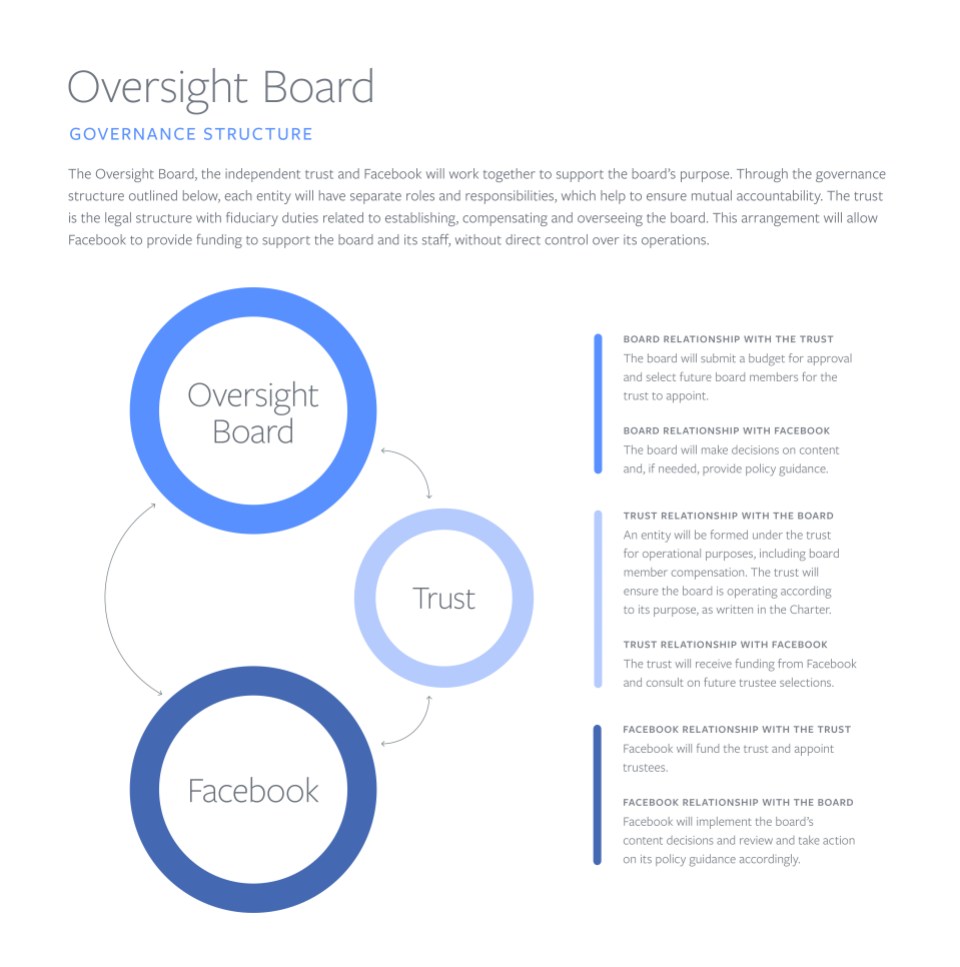Note: For future Facebook updates about Oversight Board cases, please visit the Transparency Center.
“The content policies we write and the decisions we make every day matter to people. That’s why we always have to strive to keep getting better. The Oversight Board will make Facebook more accountable and improve our decision-making. This charter is a critical step towards what we hope will become a model for our industry.”
– Nick Clegg, VP Global Affairs and Communications, Facebook
Since November, when Mark Zuckerberg first wrote about his vision for how content should be governed on Facebook, a team within our company has been working to design and implement this idea, with the help of input and feedback from people all around the world.
Today, we’re announcing more details on the structure of the Oversight Board and its relationship to Facebook in the form of a charter. This central governing document defines the board’s mandate and describes its relationship to Facebook. It establishes its membership, governance and decision-making authority, and it sets out parameters for things like the size, scope and power of the board. In the coming months this charter will be available in multiple languages on a new board website.
Accompanying the charter is a letter from Mark Zuckerberg explaining the board’s purpose and goals.
Governing Documents
This charter is only one of many documents that will govern the Oversight Board. We are also crafting bylaws which will provide greater operational detail on the board’s institutional independence and rules of procedure. These bylaws will include accountability mechanisms, such as a code of conduct and board member disqualifications. They will also elaborate on the processes for assembling panels, developing case materials and implementing board decisions. While we are preparing these bylaws on the board’s behalf, ultimately the board alone will have the ability to change them.
Governance Structure
We often received a key piece of feedback: make sure the board is independent from Facebook. One way we’re addressing this is by establishing an independent trust. The Oversight Board, the trust and Facebook will have separate roles and responsibilities, all of which will work to ensure that the board is set up for success.
As part of our overall transparency efforts, trust documents will be publicly released, and these will establish the formal relationship between the board, the trust and Facebook.
Design Decisions for the Board
Along with the charter, we are providing a summary which breaks down the elements from the draft charter, the feedback we’ve received, and the rationale behind our decisions in relation to both. Many issues have spurred healthy and constructive debate. Four areas in particular were:
- Governance: The majority of people we consulted supported our decision to establish an independent trust. They felt that this could help ensure the board’s independence, while also providing a means to provide additional accountability checks. The trust will provide the infrastructure to support and compensate the Board.
- Membership: We are committed to selecting a diverse and qualified group of 40 board members, who will serve three-year terms. We agreed with feedback that Facebook alone should not name the entire board. Therefore, Facebook will select a small group of initial members, who will help with the selection of additional members. Thereafter, the board itself will take the lead in selecting all future members, as explained in this post. The trust will formally appoint members.
- Precedent: Regarding the board, the charter confirms that panels will be expected, in general, to defer to past decisions. This reflects the feedback received during the public consultation period. The board can also request that its decision be applied to other instances or reproductions of the same content on Facebook. In such cases, Facebook will do so, to the extent technically and operationally feasible.
- Implementation: Facebook will promptly implement the board’s content decisions, which are binding. In addition, the board may issue policy recommendations to Facebook, as part of its overall judgment on each individual case. This is how it was envisioned that the board’s decisions will have lasting influence over Facebook’s policies, procedures and practices.
Process
Both Facebook and its users will be able to refer cases to the board for review. For now, the board will begin its operations by hearing Facebook-initiated cases. The system for users to initiate appeals to the board will be made available over the first half of 2020.
At a high level, the following graphic outlines the basic process by which the board will select, review and decide upon cases and how Facebook will implement and respond to those decisions:
As a first step, we’ve identified guidelines for how we will prioritize our most significant and difficult cases for Facebook’s referrals to the board. Our current thinking focuses on indicators that demonstrate cases are both significant and difficult:
- Significance: Significant means that the content involves real-world impact. The content in question should involve issues that are severe, large-scale and important for public discourse. Factors include:
- Severity. The content threatens someone else’s voice, safety, privacy, or dignity.
- Scale. The content reaches or affects a large number of people and/or illustrates a larger trend or issue on Facebook.
- Public Discourse. The content spurs significant public debate and/or important political and social discourse.
- Difficulty: The decision on the content raises questions about current policy or its enforcement. Strong arguments could be made for either removing or leaving up the content. Factors include:
- Disputed. There is disagreement about Facebook’s decision on the content and/or the underlying policy or policies.
- Uncertain. There is uncertainty about the correct decision according to Facebook’s policy.
- Competing. There is a tension between equally important values. A reasonable person could imagine both arguments to remove the content or keep it up, and a decision either way necessitates a trade-off between values.
While today is an important milestone, there is much more work we still need to do.
Over the next few months, we will continue testing our assumptions and ensuring the board’s operational readiness. In addition, we will focus on sourcing and selecting of board members, finalizing the bylaws that will complement the charter, and working toward having the board deliberate on its first cases early in 2020.
We are committed to consulting outside experts at every step, and we look forward to providing more updates on our progress.


